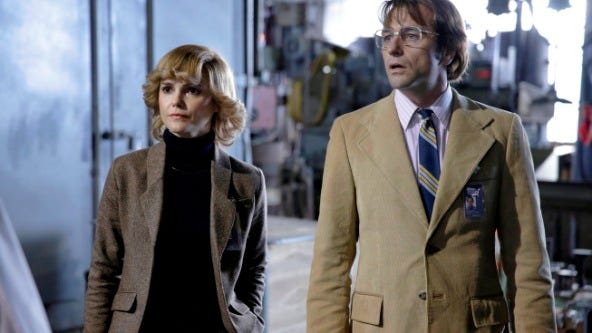So What, Who Cares (vol 1, issue 14) Why Betty White should remake the "Your brain on drugs" PSA
Hello! It is very nearly the end of January and I still have not solidified my resolutions for 2015 beyond "Reduce household food waste to near-zero," which is something of a challenge when one member of the household is a preschooler with an unpredictable appetite. What are some of your no-fail ways to curb personal food waste? Or what are some of your goals for 2015? Tell me via Twitter or email.
*

We're going to need a PSA on how to talk to your parents about their brains on drugs. Senior citizens are knocking back the cocktails while also taking prescription medications that are alcohol-interactive (AI). An alcohol-interactive medication is one where the drug contains an ingredient that interacts with the alcohol; the best-case scenario is that the drug is rendered less effective, while more severe cases mean that symptoms (blood sugar levels, blood pressure) or side effects (sleepiness) are amplified, to the detriment of the drinker.
The National Institute on Alcohol Abuse and Alcoholism found that 78% of senior citizens are taking alcohol-interactive medications and indulging in a few drinks.
(Meanwhile, in the U.K., the rate of senior citizens entering rehab for alcoholism has surged; the national heath service is also facing a rise in STDs among the elderly and logging a rise in marijuana use.)
So what? As you age, your body's ability to metabolize alcohol slows, as does your body's ability to metabolize different medications. As epidemiologist Rosalind A. Breslow explains:
"Diazepam - known as Valium - hangs around in the body about three times longer in a 60-year-old than a 20-year-old, thereby creating a much longer window for potential interactions with alcohol."
Seniors taking cardiovascular agents (blood pressure medications), central nervous system agents (sleeping pills), pain medications, muscle relaxers, metabolic agents (diabetes and cholesterol drugs), and psychotherapeutic agents (antidepressants) all need to ask their doctors about the potential for alcohol interactions.
Who cares? Other than senior citizens who are all, "You will pry my Valium-and-martini happy hour out of my cold, arthritic hands?" Professionals in the senior healthcare field, who will have to figure out ways to assess alcohol activity and educate their patients have a stake in this news breaking big.
It may also affect how senior citizens are assessed in the event of a automobile accident -- and there are a lot of senior drivers, with 84% of all Americans aged 65 and older licensed to drive, 68% of motorists over age 85 on the road 5 days a week -- and more than 75% of senior drivers are on one or more medications.
*

If you need to curb your e-commerce habit for a bit, sublimate the urge to shop by watching TV. Researchers at Wharton, the Technical University of Darmstadt, Germany, and Johann Wolfgang Goethe University in Frankfurt-am-Main had originally hypothesized that TV-watching couch potatoes would be more likely to casually click the "complete order" on a shopping cart, but they found the opposite.
So what? This is the first study to have actual data demonstrating a correlation between TV-watching and e-commerce. Granted, it's data from a German TV audience, so it remains to be seen if U.S. TV viewers can manage to excel at consuming-while-watching, but the researchers are arguing that this study shows the limit of people's attention when it comes to watching one screen and actively engaging with another.
Who cares? People who buy and sell ads on television, that's who. Any time you're asking people to tweet for a brand or stampede onto a social network, you're engaging them -- but people only have so much bandwidth, and if they're "second-screening" (you know, watching TV while tweeting or texting), then they won't be shopping. So brands will need to rethink whether or not they want to tie their TV ad campaigns to any interactive elements.
*

Your pop culture note of the day: The Americans is a typically-good FX drama, but part of my enduring fascination with it stems from when it takes place. I was an elementary schooler in the early 1980s, so I remember things like watching the Columbia landing during a school assembly or getting a little thrill every time I looked at my Miss Piggy lunch box. But I didn't really become an avid observer/nascent consumer of the music or fashion of the era until about 1985 or so.
So The Americans is almost a memory supplement -- I can see a prairie skirt and high-necked blouse, or a pair of narrow jeans tucked into a pair of burgundy Aigner boots and the sight adds texture to my recall of ordinary childhood events. And I so appreciated this profile of The Americans' costume designer Jenny Gering. It's a wonderful look at the research, planning, scrounging and sewing that goes into crafting the period-perfect outfits everyone has.
As for the music on the show, the definitive piece on the excellent use of music in season one is right here, and the showrunners explain why they dialed it back on memorable musical sequence in season two.
*
Did you miss an issue of So What, Who Cares? The archive is here. Are there typos? I apologize in advance.
As always, I welcome your feedback and suggestions -- you can reach me through Twitter or email. Please do not hesitate to let me know what you think about So What, Who Cares. I've gotten some GREAT links and news pointers from you all.
If you really like it, tell a friend to subscribe.

